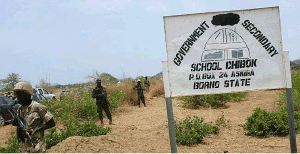Senior Correspondent, ISHAYA IBRAHIM, analyses the atmosphere in Chibok community, which hosted the school that experienced the recent abduction of over 200 girls
Chibok is a local government area in Borno State, with its headquarters in Chibok Town. The people speak Chibok and are largely Christians. With a population of 66,105 persons, the people of Chibok occupy an area of land approximately 1,350 km. It is a farming community, with really nothing remarkable to attract the attention of the world to it. But when Boko Haram abducted more than 200 girls in that sleepy community, the world took notice of it.
Since the abduction that took place on the night of April 14, at the only exclusive girls’ secondary school in the town, its people have been living in pains. And the only way they have been consoling themselves has been through prayer sessions in churches and homes of parents whose children were among the abducted.
A parent of one of the abducted children, who gave her name as Mary, told British Broadcasting Corporation (BBC) Hausa Service that she had not slept since the abduction. She said she felt like dying.
“Anytime I remember that my daughter is not with me, I feel like dying. My appeal to the Borno governor and the president (Goodluck Jonathan) is that this is not something that is difficult for them to do. They have the cars, the soldiers, and everything. Please help us. But we have not been hearing any good news from them. All we hear from them is bad news,” she said.
Another parent of the abducted girls, identified as Mallam Ayuba, who also spoke with the BBC, said the parents were experiencing deteriorating health condition on account of the abduction of the girls.
“We have not been able to eat and sleep since we learnt of the kidnap of our children. The only thing that has been keeping us is the prayer we usually hold,” he said.
But why did Boko Haram abduct Chibok girls? The BBC Hausa Service in a special report said the group wants women to stop attending schools, and so used the abduction to drive home its point that girl-child education is intolerable.
“They have been waging war against schools, a situation that has resulted in the closure of schools in Borno State. But the only girls’ school in Chibok was opened for the annual West African Examination Council (WAEC) tests. But there were no security operatives to protect them. So, Boko Haram capitalised on the opportunity to abduct the girls,” the report said.
The Islamic fundamentalist sect’s stance against western education is expressed even in it’s name, Boko Haram (western education is sin). In one of the videos released by the group, its leader, Abubakar Shekau, instructed his fighters to begin a killing spree of anyone that didn’t belong to their group, except women and mad people. In the same video which was released in March, shortly after his members attacked Giwa Barracks in Maiduguri, Borno State capital, Shekau threatened to begin abduction of girls.
Also, at the time the terrorists attacked the Federal Government College, Buni Yadi, early this year, killing 29 school boys, it spared the girls in the school, with a warning for them never to return to school again, but to go home and get married. But whom they should be married to, Boko Haram did not say, since no one is really spared in their killings.
Though the figures of the abducted girls is still fluctuating, of the 234 girls the school authorities said are missing, 58 have reportedly been found and re-united with their families. The girls, who were narrating their experiences to the foreign media, said they escaped by jumping off the moving lorries conveying them to the camps of their captors.
The anxiety of the people of Chibok has heightened with reports from the Associated Press (AP), a United States of America (U.S.) news agency, that an agent between the government and Boko Haram has confirmed to them that two girls have died from snake bite while 11 others were critically ill.
Shekau has also added to their anxiety when he said he had the girls and would sell them off to no one in particular.













